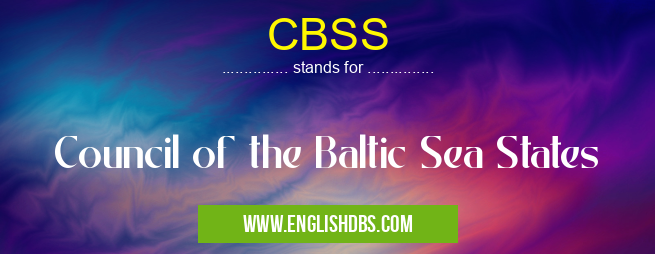What does CBSS mean in COUNCIL
The Council of the Baltic Sea States (CBSS) is an intergovernmental regional organization established in 1992 to promote stability and economic cooperation throughout the Baltic Sea Region. The CBSS brings together nine countries located around the Baltic Sea, including Denmark, Estonia, Finland, Germany, Iceland, Latvia, Lithuania, Poland, and Sweden. Through diplomatic dialogue and strategic partnerships with various international organizations, the CBSS works to develop common policies that serve the interests of all its member states. Its overall aim is to foster sustained political and economic progress throughout the region by promoting sustainable development, regional safety and security, democracy and human rights protection as well as increased trade in goods and services.

CBSS meaning in Council in Governmental
CBSS mostly used in an acronym Council in Category Governmental that means Council of the Baltic Sea States
Shorthand: CBSS,
Full Form: Council of the Baltic Sea States
For more information of "Council of the Baltic Sea States", see the section below.
» Governmental » Council
Purpose & Goals
The primary goal of the Council of the Baltic Sea States (CBSS) is to provide a platform for dialogue between the nine states within the region so that they can cooperate more closely on topics such as climate change, security challenges, energy cooperation and resource management. It seeks to find solutions that are mutually beneficial for all parties involved while ensuring compliance with both domestic laws and international obligations. It also promotes increased mobility through initiatives such as student exchanges between member states' universities. In addition to providing a forum for dialogue and policy-making among its members, the CBSS also partners with other international organizations in order to increase its capacity for action in matters related to energy efficiency and environment protection throughout the region.
Achievements
Since its inception in 1992, the Council of the Baltic Sea States has achieved numerous goals related to strengthening cooperation amongst its member states through initiatives such as inter-state dialogues on how best to tackle energy challenges or protect human rights. Furthermore it has facilitated increased economic integration through projects like taxation harmonization which have enabled business owners from various countries in Northern Europe who operate across multiple countries within this region's borders take advantage of lower tax burden than before while still complying with both domestic laws and international obligations. Additionally it has contributed significantly towards sustainability efforts by helping members reduce pollution emission levels by providing them with technical capabilities required for successful implementation of new environmental regulations developed at EU level or beyond.
Essential Questions and Answers on Council of the Baltic Sea States in "GOVERNMENTAL»COUNCIL"
What is the Council of the Baltic Sea States?
The Council of the Baltic Sea States (CBSS) is an intergovernmental organization created to promote cooperation between countries bordering the Baltic Sea. CBSS was founded in 1992 and its current members include Denmark, Estonia, Finland, Germany, Iceland, Latvia, Lithuania, Norway, Poland, Russia and Sweden.
What are the goals of CBSS?
The CBSS aims to develop regional cooperation in areas such as democracy and human rights protection, environmental protection and sustainable development, economic development and growth and public health. Additionally it works to build on common values shared by participating countries.
Who runs CBSS?
The highest decision-making body of the CBSS is its Ministerial Meeting which meets every two years. Between meetings a Senior Officials Committee supports implementation of decisions taken by ministers. The Secretariat serves as a permanent executive body for operational coordination activities of CBSS working bodies.
Does CBSS have any partners?
Yes! In addition to government partners, the CBSS is supported by non-governmental organizations such as universities, business associations and civil society groups. These partnerships help ensure that all social groups can take an active part in fulfilling the goals set out by the council.
How does CBSS approach environmental protection?
Environmental protection is one of the main areas addressed by CBSS through initiatives such as regular inspections at sea ports or specialized programs like “Green Ports†which focuses on reducing air pollution from ships in Baltic Sea ports as well as improving energy efficiency in seaports operations.
What initiatives is CBSS currently undertaking?
CurrentlyCBSScontinuesfocusedon Regional Policy Cooperation (RPC), with subprograms including Digitalisation & Innovation; Employment & Social Life; Education & Employability; Environment & Energy; Mobility & Transport; Research&Innovationand Culture&Tourism.
Is participation open to all countries bordered by Baltic Sea?
Yes! Any country touching waers of Baltic Sea may become a member after ratifying Accession Document associated with Charter on Good Neighborly Relations signed by nine founding states.
How do non-governmental organizations contribute to CBBS objectives?
NGOs provide vital input for shaping projects generated by CBBS thoughparticipationonvarious working groups tackling topics such as political issues or research & innovation programms. Besides taking part in project design stages their expertiseisvaluableindevelopmentof best practices papers meant to be spread among other CBBS member states.
Are there educational outreach programs designed for students?
Yes! Programs such as GEMME — Green Economy Model Mediterranean Seas — provide academic trainings targeting both secondary and higher education institutions located near Baltic area teaching environment sustainability aspects connected withexploitationofRegionalSeasresources.
Final Words:
Overall The Council of the Baltic Sea States (CBSS) has been a successful platform that has helped facilitate better understanding amongst stakeholders around this region's sea waters while enabling them take constructive action towards meeting shared objectives on issues ranging from climate change responses to education reform or sustainable development projects. By increasing awareness about relevant topics itself or through partnership arrangements with various international organizations it enables better coordination between different member states when implementing multilateral policies beneficial for all those involved without putting undue pressure upon any one particular country's resources or budget constraints. Such actions are essential for achieving sustained progress within this vast area over long period of time.
CBSS also stands for: |
|
| All stands for CBSS |
